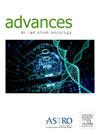提高放射肿瘤学同行评议质量的提供者实践、感知障碍和促进因素
IF 2.2
Q3 ONCOLOGY
引用次数: 0
摘要
目的放射肿瘤学同行评议评估具体病例的定性治疗计划决策。我们试图了解同行评议的跨学科观点,以确定影响利益相关者参与和建议实施的因素。材料和方法对放射肿瘤学同行评议参与者进行半结构化访谈和李克特调查(量表,0-10分),录音并转录。两个独立的编码员使用了基于理论的方法来提取主要主题。结果研究对象包括6名学术肿瘤学家和3名社区放射肿瘤学家、2名居民、2名医学物理学家、2名放射治疗师、4名剂量测量师和1名行业代表。同行评审的主题优先事项包括遵守机构指南、为决策提供信息的临床背景、发现罕见错误和教育。关键的促进因素包括预处理同行评审、明确的计划指导方针和对同行建议的反馈。采用建议的障碍包括资源限制和缺乏指导定性建议的前瞻性数据。通过李克特调查对参与者感知到的同行评审的好处进行了评估,其中减少实践差异(8.0)和教育(7.6)的价值较高,发现医疗差错(7.4)和减少治疗交付事件(6.9)的价值较低。当比较参与者角色的Likert评分时,非医生对同行评阅的总体重要性(平均值,9.8 vs 6.5, P = 0.03)和教育(平均值,9.0 vs 6.7, P = 0.02)的评分明显高于医生。结论放射肿瘤学的参与者承认同行评议的重要性,但在感知到的益处方面存在显著差异。临床实践和非医师参与教育的一致性被赋予了更高的价值。未来的过程,以改善沟通和前瞻性的计划审查被认为是有益的同行评议介导的计划变更。本文章由计算机程序翻译,如有差异,请以英文原文为准。
Provider Practices and Perceived Barriers and Facilitators in Improving Quality Practices in Radiation Oncology Peer Review
Purpose
Radiation oncology peer review evaluates case-specific qualitative treatment planning decisions. We sought to understand interdisciplinary perspectives on peer review to identify factors affecting stakeholder engagement and implementation of recommendations.
Materials and Methods
Semistructured interviews and Likert surveys (scaled, 0-10) with radiation oncology peer review participants were audio-recorded and transcribed. Two independent coders utilized a grounded theory approach to extract dominant themes.
Results
Participants included 6 academic and 3 community radiation oncologists, 2 residents, 2 medical physicists, 2 radiation therapists, 4 dosimetrists, and 1 industry representative. Thematic priorities of peer review included adherence to institutional guidelines, clinical background to inform decision-making, detection of rare errors, and education. Key facilitators included pretreatment peer review, clear planning guidelines, and feedback on peer recommendations. Barriers to recommendation adoption included resource limitations and a lack of prospective data guiding qualitative recommendations. Participants perceived benefits of peer review were assessed with Likert surveys with higher values placed on reducing practice variation (8.0) and education (7.6) and a lower value placed on the detection of medical errors (7.4) and reduction of treatment delivery incidents (6.9). When comparing Likert scores by participant role, nonphysicians rated the overall importance of peer review (mean, 9.8 vs 6.5, P = .03) and education (mean, 9.0 vs 6.7, P = .02) significantly higher than physicians.
Conclusion
Participants in radiation oncology acknowledged the importance of peer review, but there was significant variation in the perceived benefits. A higher value was placed on the alignment of clinical practice and nonphysician participant education. Future processes to improve communication and prospective plan review were identified as beneficial to peer review-mediated plan changes.
求助全文
通过发布文献求助,成功后即可免费获取论文全文。
去求助
来源期刊

Advances in Radiation Oncology
Medicine-Radiology, Nuclear Medicine and Imaging
CiteScore
4.60
自引率
4.30%
发文量
208
审稿时长
98 days
期刊介绍:
The purpose of Advances is to provide information for clinicians who use radiation therapy by publishing: Clinical trial reports and reanalyses. Basic science original reports. Manuscripts examining health services research, comparative and cost effectiveness research, and systematic reviews. Case reports documenting unusual problems and solutions. High quality multi and single institutional series, as well as other novel retrospective hypothesis generating series. Timely critical reviews on important topics in radiation oncology, such as side effects. Articles reporting the natural history of disease and patterns of failure, particularly as they relate to treatment volume delineation. Articles on safety and quality in radiation therapy. Essays on clinical experience. Articles on practice transformation in radiation oncology, in particular: Aspects of health policy that may impact the future practice of radiation oncology. How information technology, such as data analytics and systems innovations, will change radiation oncology practice. Articles on imaging as they relate to radiation therapy treatment.
 求助内容:
求助内容: 应助结果提醒方式:
应助结果提醒方式:


